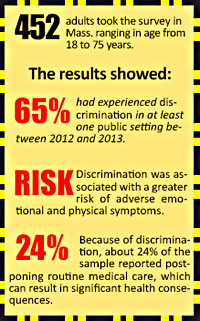 According to a recent Study, gender minority people who are transgender or gender nonconforming experience widespread discrimination and health inequities. Since 2012, Massachusetts law has provided legal protections against discrimination on the basis of gender identity in employment, housing, public education, and business. However, the law does not protect against discrimination based on gender identity in places open to the public, such as transportation, retail stores, restaurants, health care facilities, and bathrooms.
According to a recent Study, gender minority people who are transgender or gender nonconforming experience widespread discrimination and health inequities. Since 2012, Massachusetts law has provided legal protections against discrimination on the basis of gender identity in employment, housing, public education, and business. However, the law does not protect against discrimination based on gender identity in places open to the public, such as transportation, retail stores, restaurants, health care facilities, and bathrooms.
A new Early Exclusive View study in The Milbank Quarterly that surveyed transgender and gender nonconforming adults in Massachusetts has found that discrimination in public settings is not only common, but is associated with adverse health outcomes (read the abstract here). The study, by lead author Dr. Sari Reisner of The Fenway Institute at Fenway Health and Harvard T.H. Chan School of Public Health, and colleagues, examines the relationship between social stressors, including discrimination, and the health and well-being of gender minority adults in Massachusetts since the 2012 implementation of the state’s gender identity nondiscrimination law. It also looks at the frequency and health correlates of public-setting discrimination among gender minority adults in Massachusetts, with particular attention to discrimination in health care settings, such as health centers, hospitals, and nursing homes. [pullquote]A new Early Exclusive View study in The Milbank Quarterly that surveyed transgender and gender nonconforming adults in Massachusetts has found that discrimination in public settings is not only common, but is associated with adverse health outcomes (read the abstract here).[/pullquote]
Currently, 18 states, including Massachusetts (and the District of Columbia) have gender identity nondiscrimination laws that provide protections against discrimination in employment, housing, public education, and business/credit. Massachusetts is the only one of these states in which the law, which was established in 2012, does not protect against discrimination in public settings. Since the 2012 enactment of the gender identity nondiscrimination law in Massachusetts, this is the first study to explore experiences of discrimination, including those in public settings.
The researchers surveyed 452 adults in Massachusetts ranging in age from 18 to 75 years and found:
- 65% had experienced discrimination in at least one public setting between 2012 and 2013.
- Discrimination was associated with a greater risk of adverse emotional and physical symptoms.
- Because of discrimination, about 24% of the sample reported postponing routine medical care, which can result in significant health consequences.
“Passage and enforcement of transgender rights laws that include protections against discrimination in public settings, inclusive of health care, is a critical public health policy approach needed to move toward health equity,” says Dr. Reisner. Study authors included researchers from The Fenway Institute, Yale School of Public Health, Heller School for Social Policy and Management at Brandeis University, and Wagner School of Public Service at New York University, and Massachusetts Transgender Political Coalition. [pullquote]Currently, 18 states, including Massachusetts (and the District of Columbia) have gender identity nondiscrimination laws that provide protections against discrimination in employment, housing, public education, and business/credit. [/pullquote]
Continuously published since 1923, The Milbank Quarterly ( features peer-reviewed original research, policy review, and analysis from academics, clinicians, and policymakers. The Quarterly’s multidisciplinary approach and commitment to applying the best empirical research to practical policymaking offer in-depth assessments of the social, economic, historical, legal, and ethical dimensions of health and health care policy. The Milbank Quarterly is published in March, June, September, and December on behalf of the Milbank Memorial Fund by John Wiley & Sons.
Since 1971, Fenway Health has been working to make life healthier for the people in our neighborhood, the LGBT community, people living with HIV/AIDS and the broader population. The Fenway Institute is an interdisciplinary center for research, training, education and policy development focusing on national and international health issues.
[From a News Release]








A related issue I’ve been concerned about is how throughout their childhood gender-nonconforming kids can feel alienated by the media because rarely are they able to find any pre-adolescent gender atypical fictional characters they can identify with. For those of you who are interested in the topic, I just had an in-depth article published on it.
“Still Trapped in the U.S. Media’s Closet: Representations of Gender-Variant, Pre-Adolescent Children”
http://www.tandfonline.com/doi/full/10.1080/00918369.2015.1021634#abstract